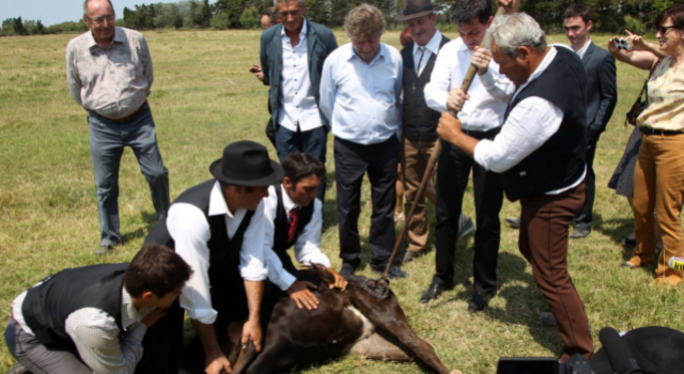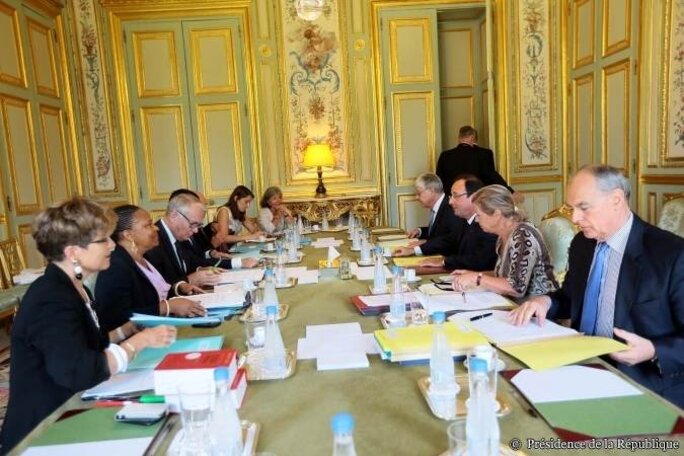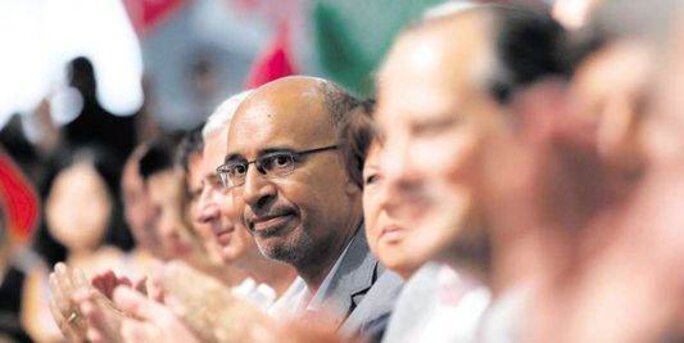Having been, when he was at the head of the Socialist Party, a skillful blender of opposing ideas, is François Hollande now becoming the president of paralysing contradictions? Since his election in May 2012 the chronicle of cock-ups, internal battles and other inter-ministerial spats that have punctuated the daily life of the government cannot just be put down to an administration learning the ropes of power, to public relations errors or a lack of synchronisation of the government’s agenda.
From the removal of Nicole Bricq just a month after she had been made environment minister to the brutal sacking of her successor Delphine Batho at the start of the summer, from the rejected resignation of productive recovery minister Arnaud Montebourg, who had been publicly disowned by the prime minister's office over the Florange steelworks affair, to the forced resignation of Jérôme Cahuzac, who was guilty of having lied to the highest authorities in the land. From the shameful adoption – shameful because there were no requirements placed on companies in return – of the 20 billion euro tax credit for businesses known as Crédit d'impôt pour la compétitivité et l'emploi (CICE) to the endless clashes between Montebourg and environment ministers over nuclear power or drilling for shale gas: from the 'triangulation' policy of interior minister Manuel Valls who builds his reputation by borrowing from the Right – even the extreme right – his favourite themes on the Roma people, crime, immigration and secularism, to the absurd quarrels between different parts of the finance ministry, there has been no end to the quarrels, rows and other skirmishes between government ministers, all of them inevitably closed by an absurd reminder from the prime minister’s office that there is only one government line.
These conflicts cannot just be seen as turf wars or battles of egos or differences over the pace of reforms, as the compulsive media deciphering of government behaviour would have us believe. And nor is it a sign of democratic energy, showing the intensity and richness of debate going on inside the government.

Enlargement : Illustration 1

Of course there are differing judgements that have to be adjudicated on by either the prime minister's office Matignon or the president's office at the Elysée. It's part of the daily life of democracies and the notion of arbitrating, as long as it is not giving way to lobby groups or transnational bodies, is even inherent in the very idea of democracy. A decision by a government is the political form of a choice that is carried out in the name of the public interest through democratic deliberation.
But the “adjudications” made by our Janus-like president are non-choices. The latest, that on the reform of the criminal law and prison sentencing, provides a very clear example. It is a non-choice between “prison only” on the one hand and betting on probation sentences on the other, a kind of amalgam of criminal justice solutions and law and order grandstanding, a César-like (1) compression of judicial procedures, law and order slogans and media clichés on repeat offending. This, then, is the François Hollande version of 'Caesarism', a paradoxical Caesarism that is based on indecision, and whose political form is “compression”.
The Paris-based international prison reform and monitoring body the Observatoire international des prisons (OIP) has thus attacked the proposals in the criminal justice system reforms for choosing “billboard politics” rather than “opting for education to help create a criminal justice system that is more effective at preventing repeat offending, to help mend behaviour and reinsert people back into society just as much as it is about getting away from a prison system with chronic overcrowding and which gives rise to constant abuses of fundamental rights”.
When it comes to the non-choices of Hollandisme, the list has simply been growing over the last year and involves a good number of promises made by the “normal” candidate during his 2012 election campaign. These promises have been postponed or even completely disowned in the case of the renegotiation of the Lisbon Treaty, the inability to carry out tax reform and the refusal to grant votes to non-EU foreigners in local elections or to require police officers to give a formal receipt to those whom they stop and search.
And far from taking a break during the summer, Hollande ambivalence was on full show. While the president succeeded in having a reasonably-well choreographed period in which he toured France with a social message – that of a self-fulfilling prophecy of the return to economic growth – his message was then undermined by two ministers who are former supporters of ex-IMF boss Dominique Strauss-Kahn, Manuel Valls and finance minister Pierre Moscovici.
One of them, Moscovici, succeeded with just one little phrase in pouring cold water over the hopes of recovery that François Hollande had been working so hard to sell during his trips to the provinces. The other, Manuel Valls, went as far as to give a wide-ranging speech on general politics – beyond his remit as interior minister – on the very eve of the president’s televised interview on Bastille Day. At a stroke François Hollande's authority was undermined, and the image of his presidency reduced to that of a kind of regent, whetting the appetite of the pretenders to the throne.
-------------------------------------------
1. The author is referring to the French sculptor César Baldaccini - usually just referred to as César - who was known for his works that involved compressing old cars into dense packages. The writer then refers to 'Caesarism', in other words the form of dictatorial rule made famous by Julius Caesar; this is a play on words as the artist's name 'César' is also the word for Caesar in French.
Valls and a marketing narrative

Enlargement : Illustration 2

In branding a bull with a red branding iron (see photo above) in the Camargue area of southern France at the start of the summer, Manuel Valls was doing more than indulging in a photo opportunity to provide an image of authority, he was revealing the hidden mechanism of his strategy towards gaining power; the marketing or branding narrative. It is from the 'branding' of animals that the modern sense of the word branding – meaning marketing – comes. So the branding of that bull was a, perhaps unwitting, revelation of Valls's marketing strategy: to create a culturally coherent 'brand' that tells the story of the product – Valls. This is a mixture of authority, of pseudo 'authenticity' and of a very real aggression.
This is the epitome of what might be termed Vallssism. It involves not just setting the scene but also giving a complex performance in which the impact of quotations and political references combines with a succession of over-the-top messages aimed at differentiating himself from his ministerial colleagues in his tough comments on the Roma people, Islam, the wearing of the veil at university, the issue of immigrant workers being allowed to settle their families in France or, once again, the bombardment via the media of the sentencing reforms put forward by justice minister Christiane Taubira. At the Socialist Party's annual conference at La Rochelle in 2012 the public conflict on display was between Montebourg and Moscovici over the government’s new public investment bank, the Banque publique d’investissement (BPI). At the 2013 conference the main show was the open warfare between Valls and Taubira over sentencing law reform.
Valls has learnt from Anglo-Saxon spin doctors the politics of triangulation invented by US president Bill Clinton's advisers and put into operation by Tony Blair's press spokesman Alastair Campbell. This involves putting yourself above the usual political boundaries, in adopting elements of the policies and the language used by the opposite side and building a neutral image, which wins you the support of some on the Right. Valls, therefore, never holds back from asserting that law and order policy is neither of the Left or the Right. And that neo-liberal adjustment policies are common-sense policies. Thus he resorts to denouncing Christiane Taubira's “softness” on crime, or talking about repressive measures when there's a headline-grabbing crime committed.
By sending these signals to the opposition’s electorate, Valls earns himself a high ranking in the opinion polls and hauls himself up to the status of a candidate to be reckoned with, whose credibility is built on polling. For the media love nothing so much as their own creature. A political product with a strong identity who provides a narrative able to feed their all-consuming news agenda. It is the virtuous cycle of opinion poll legitimacy. Fed by the media, the elector, who is an experienced player, does not want to lose, so he does not choose; instead he waits for a choice already confirmed by the polls, and he joins the already announced winning side. That is Vall's gamble, to put himself permanently at the head of the polls to impose his credibility as a presidential candidate, including in opposition to the current president François Hollande.
The PS's summer conference brought to light the deep confusion that undermines the government’s actions. This confusion is, first of all, political because for the first time since the party's conference at Épinay in 1971 - when under François Mitterrand it helped form a broad coalition of the Left - the Socialist Party does not have a pluralist strategy comparable to that of the Front populaire of 1936, the Programme commun or Common Programme of 1972 or the Gauche plurielle – Plural Left – of 1997. The permanent rift with the radical left Front de gauche, despite any attempts there might be to sow division in its ranks in the run-up to next spring's local elections, means the PS can only rely on its own supporters and the rebellious supporters of its green allies Europe Écologie – Les Verts(EELV) and the Parti Radical de Gauche.
Without a strategy the Socialist Party is no longer the party of Épinay. Is it, for all that former PS member and now the leading figure of the Front du gauche Jean-Luc Mélenchon likes to claim, simply now the isolated party of Solférino, in reference to the Paris street where its headquarters is based? If one had to position it on the political spectrum it would probably be best to describe it as Valoisien if not “Vallssien”, like the old French Radical Party that started out on the Left and moved to the centre-right – or Tony Blair's New Labour party in Britain. These are electioneering parties adept at the triangulation ideology and doomed to create an artificial blending of policies and to perform electoral contortions and who, like the petty bourgeoisie in Marxist thought, are constantly buffeted between capital and labour, and whose only remaining genetic legacy of the Left is a Pavlovian defence of secularism. This is a recycled secularism that has moved away from its origins as a defence of the Republic and its rights against the powerful intrusion of the Catholic Church, instead targeting an Islam that is not really part of the institutes of state and people originally from the run-down suburbs, rather than smart residential areas; all of which changes radically the socio-political order of things.
But the socialists' confusion is also ideological. It is about a question that is being asked at the heart of the party itself, and that both Valls and Taubira have asked in their own way, one by protesting their allegiance to the Left, the other by educating and explaining. This question is: what does it mean to be “of the Left” today? The very person who embodies this political identity crisis is the current president. Seen from this point of view the performances of Manuel Valls and Christiane Taubira at the PS's summer conference provide a caricatural image of the existential contradiction in which government policy is trapped.
Hollandism – a political magnetic field
On one side there is electoral calculation, on the other the gradual dismantling of the Right's position on repeat offending; on one side the seduction of marketing politics, on the other a cultural battle. On the one side politics treated like a television series, on the other a period of intense debate. On one side the authority of an image, on the other the force of a conviction. It is the choice between electoral marketing and real political action, between the art of stage craft and that of state craft; between media distraction and political deliberation. François Hollande is unable to make this choice.

Enlargement : Illustration 3

Hollandism is neither an ideology nor political pragmatism: it is a magnetic field. It is not content with attracting ambitions, it fuels and sharpens them, playing them like opposing poles and finding within that its own source of energy. So it is not, therefore, a lack of authority that we should complain about in François Hollande but rather a form of perverse energy which toys with opposing ambitions, the excesses of others and their defiance in order to ensure the stability of a non-choice.
Keeping in reserve the current popularity of Manuel Valls – touted by many in the media as a future prime minister – while using up every ounce of current prime minister Jean-Marc Ayrault's permanent unpopularity, François Hollande's skill consists of using the media energy created by the cock-ups and the rows, to regulate the flow of different factions, to play with their strengths and their weaknesses. This devoted disciple of circumnavigating internal party factions when he was leader of the PS is a past master at playing opposites against each other. He rules not by dividing but by splitting in two Valls and Taubira, or Moscovici and Montebourg...
It is not so much the blending of different factions and and resolutions that François Hollande is trying to achieve, as he did so well as leader at Socialist Party conferences, but rather to make them interact. Rather than ideological confrontations it is the idea of having alternative factions that governs the political energy of Hollandism. Or to use another metaphor, it is a form of socialism that is “geostationary”, which moves, like satellites of the same name, in exact synchronisation with the neo-liberal planet below and which thus constantly remains above the same point on the surface.
This is what gives the feeling of timelessness and lack of historical context that has marked the start of this presidential term of office and which tends to make one forget about the prospect of a second year that offers as little in the way of expectations and is as politically stale as the first year. That is why the media activities of a Valls or a Montebourg, far from representing a return to conviction politics, precisely represent the form and nature of this government’s opposition to change.
For the increase in the number of cock-ups and rows do not reflect the intensity of the discussions at the heart of the government but the absence of deliberation, and in particular the refusal to decide between two conceptions of politics: one which endeavours to dismantle the fundamentals of the Right on issues of law and order, environmental transition, education, housing, sentencing policy, public health and immigration, or one which seeks, in the way that Clinton and Blair did, to 'triangulate' public opinion by consolidating and legitimising the dominant ideology, this neo-liberal story-making machine of victims and villains, of deserving heroes and vile fraudsters, of brave workers and foreign profiteers.
That is the historic dilemma facing Hollandism: to dismantle or to triangulate; to de-construct the dominant neo-liberal ideology or make use of it for electoral purposes. For there can be no politics of the Left without the ideological dismantling of the shared 'truisms' planted in people's minds for the last 30 years by neo-liberal politics. Without the dismantling of the sentencing policy of systematic incarceration and repressive measures that put in jeopardy the principle of individually-tailored punishment in favour of automatic minimum jail sentences. The dismantling of a model of economic growth and hyperconsumption in favour of another model, that of energy transition. The dismantling of prejudices about social security fraud, immigration and law and order. The dismantling, at last, of a mediatised democracy designed and organised to blur all democratic debate, and to install through chat-shows and newspaper editorials the shared 'truisms' of neo-liberalism. And without the democratic dismantling of Europe.
The alternative to the politics carried out by François Hollande since his election is simple: to dismantle the idea of “Tina” (“There is no alternative”), the neo-liberal slogan of Maragaret Thatcher.
Hollande is not content to move the Left to the right, he whitewashes his neo-liberal talk, he neutralises the cultural battle. There is no doubt that Hollandism represents the political form of a neo-liberal lack of sovereignty; destroyer not just of the Left but of politics in general.
The spectre of 2002 looms ahead...
Lenin criticised a certain tendency on the Left to bring everything down to politics, what he called the “jump...to politics”. French socialists have gone the other way. They have invented the “jump out of politics” which involves reducing political problems to problems of management, and problems of management to accounting problems. And turning politics into a theatre of morals where values confront one another. Lacking popular sovereignty and political strategy, the socialists are condemned to worthy electioneering which consists of sending signals to the fragmented sections of a volatile electorate but also to the opinion-makers and all those who can lend credence or popularity to a discredited government: opinion polls, credit rating agencies, editorial writers...
It is therefore a politics of signals. It involves giving signals of optimism in the middle of a crisis in confidence, signals of conviction when there is a lack of sovereignty, signals of seriousness and economic rigour aimed at the markets. Each minister is in charge of not just an area of competences and kingly authority but also of a portfolio of signals. Valls has the signals of authority. Montebourg's signals are concerned with industrial recovery. Moscovici's signals are about cooperation with the employers' organisation Medef. Cahuzac's signals as budget minister were those of financial strictness. But it's up to the leader among them to be the arbiter – the arbiter of the elegance of the signals – for signals have a nasty habit of going in different directions and contradicting each other, hence the otherwise inexplicable recurrence of so many cock-ups. It is the politics of signals or wishful thinking that seeks to bring about the “definitive and lasting” return of lost growth...

There remains the Socialist Party. Can it be the intellectual organisation able to dismantle the neo-liberal ideology that has imposed itself on all European governments for 30 years? Or will it just be a union of politicians in power, a catch-all party playing the game of triangulation to deceive supposedly forgetful electors who are leaving in ever greater numbers towards the far-right Front national?
Four years before the fateful date of April 21st 2002, when the socialist candidate for the presidential election Lionel Jospin was eliminated in the first round of voting, the sociologist and philosopher Pierre Bourdieu wrote about the successes of the Front national in the 1998 regional elections. He said their success was not due to so-called softness over law and order or immigration, as a particular Pavlovian section of the Left has repeated for the last 30 years, but instead down to a certain political practice “regimented and cynical, more attentive to elected representatives than to electors' problems”. And Bourdieu warned: “Left-wing majorities have head for disaster each time they have sought to apply their adversaries' policies and taken the electorate for forgetful fools.”
That warning has lost none of its topicality. From now on 2002 looms before us...
----------------------------------------
Christian Salmon is a writer and researcher at the Centre for Research in the Arts and Languages at the CNRS in Paris and a regular contributor to Mediapart. Watch a video of him here, with an English translation, describing the thesis behind his book 'Storytelling: Bewitching the Modern Mind'.
-----------------------------------------
English version by Michael Streeter


